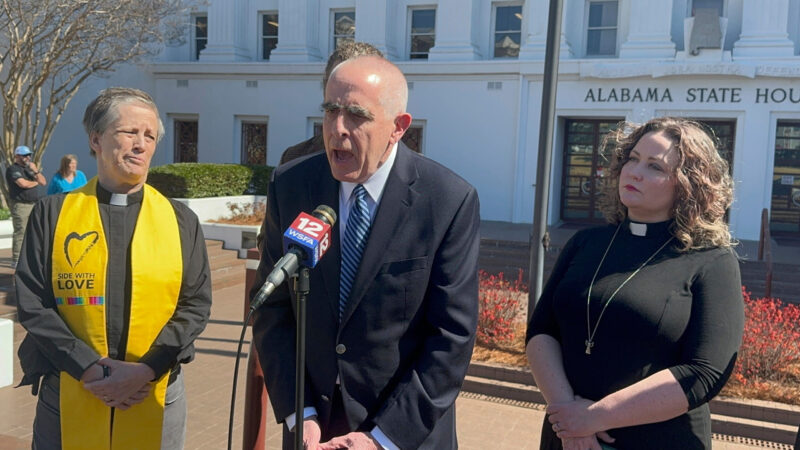Lawmakers move to mandate the display of Ten Commandments and ban pride flags in Alabama schools
Chuck Poole joins other religious leaders to speak in front of the Alabama Statehouse against bills that would mandate religious texts and instruction in schools, Montgomery, Ala., March 25, 2025.
By Safiyah Riddle
MONTGOMERY, Ala. (AP) — Alabama lawmakers approved a slew of bills on Thursday that would expand the use of Christian texts in public schools and limit protections for LGBTQ+ students, in lockstep with a national conservative agenda that has divided statehouses across the country.
Three bills led to hours of debate in the Republican-dominated Alabama House of Representatives on Thursday. The bills — passed with overwhelming majorities — would mandate in public schools the display of the Ten Commandments, ban drag shows, prohibit teachers from displaying pride flags or facilitating formal discussion of sexuality, and allow chaplains to volunteer as school counselors.
Speaker of the House Nathaniel Ledbetter described the bills as “common sense” while members of the Democratic caucus condemned the legislation as “a waste of taxpayer money” that “won’t bring down the cost of eggs.”
The legislation is part of a widespread effort in conservative states to regulate how schools handle social issues, a mission that has been championed by President Donald Trump.
Alabama joins at least 20 states that have considered legislation in 2025 that would mandate the display of the Ten Commandments in public schools or state buildings, according to an Associated Press analysis using the bill-tracking software Plural.
The sponsor of Alabama’s Ten Commandments bill, Rep. Mark Gidley, said that he did not want to promote one particular religion. Instead, he said the bill recognizes the Ten Commandments, which appear in the Old Testament of the Bible, as “one of the principal foundational documents that guided the ideas that created this great country.” The legislation said that the display should be supplemented by materials that emphasize its historical context.
In 2024, Louisiana became the first state to require that the Ten Commandments be displayed in every classroom in public schools and colleges. The law was blocked by a federal judge last year who ruled the law had an “overtly religious” purpose.
The push for the Ten Commandments in public places is far from new in Alabama.
But in past weeks, the bills have drawn vocal protest from religious leaders around the state who believe the slate of religious legislation will violate the First Amendment and create a hostile environment for religious minorities in Alabama public schools.
Steve Silberman, a rabbi who has worked at a synagogue in Mobile for 35 years, testified at a March committee hearing that he is concerned the Ten Commandments bill “unfairly sidelines Alabamians who may have diverse views of religious traditions.”
On Thursday, many legislators came forward in support of the bill.
“If you look around our nation, if you look around the world, we see so much of our Western civilization crumbling because we have forsaken the roots and foundations upon which we were built,” Republican Rep. Ernie Yarbrough said.
Bills would expand ‘Don’t Say Gay’ law
On the same day, representatives also swiftly passed two separate bills that would ban drag performances at public schools and libraries without parental consent, and ban teachers from displaying pride flags or facilitating formal discussion on LGBTQ+ issues.
Rep. Neil Rafferty, Alabama’s only openly gay legislator, testified against the bill.
“When we ban their identities from the classroom, we are telling them that the best they can hope for is silence,” Rafferty said.
He added, “I won’t help silence them, because I’ve been there, because I know what that silence feels like.”
Arkansas, Indiana, Iowa, Kentucky and North Carolina are among the states with versions of Alabama’s existing “Don’t Say Gay” law, passed in 2022, which already prohibits formal class discussion about gender and sexuality that is not “age appropriate” for students below the fifth grade. The proposed law would extend that ban to all grade levels.
A similar Florida law was rolled back in a legal settlement last year between civil rights groups and the state education department.
Also on Thursday, the Alabama Senate also advanced legislation that would put a politically appointed board in control of the Alabama Department of Archives and History. The change was first proposed last year after some lawmakers became upset about the department hosting a 2023 lecture on LGBTQ+ history.
Republican Sen. Chris Elliott, the sponsor of the bill, on Thursday praised the work of the department, but said the change is needed to ensure there is “accountability of the board back to elected officials.”
At a recent rally outside of the statehouse, Chuck Poole, who was a Baptist pastor for 45 years across Mississippi, Alabama and Georgia, said he feels the recent slate of religious bills in Alabama are part of a broader push to promote Christian nationalism across the country.
“I think it’s rooted in fear, and it’s a fear that America is changing and we are losing power and control,” Poole said.
___
Associated Press writer Kim Chandler contributed reporting from Montgomery, Alabama.
____
Riddle is a corps member for The Associated Press/Report for America Statehouse News Initiative. Report for America is a nonprofit national service program that places journalists in local newsrooms to report on undercovered issues.
For many U.S. Olympic athletes, Italy feels like home turf
Many spent their careers training on the mountains they'll be competing on at the Winter Games. Lindsey Vonn wanted to stage a comeback on these slopes and Jessie Diggins won her first World Cup there.
Immigrant whose skull was broken in 8 places during ICE arrest says beating was unprovoked
Alberto Castañeda Mondragón was hospitalized with eight skull fractures and five life-threatening brain hemorrhages. Officers claimed he ran into a wall, but medical staff doubted that account.
Pentagon says it’s cutting ties with ‘woke’ Harvard, ending military training
Amid an ongoing standoff between Harvard and the White House, the Defense Department said it plans to cut ties with the Ivy League — ending military training, fellowships and certificate programs.
‘Washington Post’ CEO resigns after going AWOL during massive job cuts
Washington Post chief executive and publisher Will Lewis has resigned just days after the newspaper announced massive layoffs.
In this Icelandic drama, a couple quietly drifts apart
Icelandic director Hlynur Pálmason weaves scenes of quiet domestic life against the backdrop of an arresting landscape in his newest film.
After the Fall: How Olympic figure skaters soar after stumbling on the ice
Olympic figure skating is often seems to take athletes to the very edge of perfection, but even the greatest stumble and fall. How do they pull themselves together again on the biggest world stage? Toughness, poise and practice.







